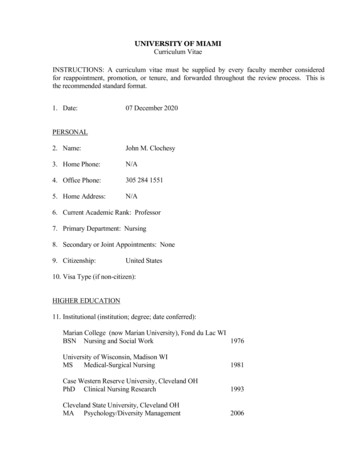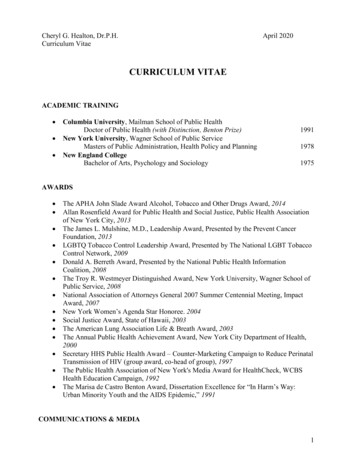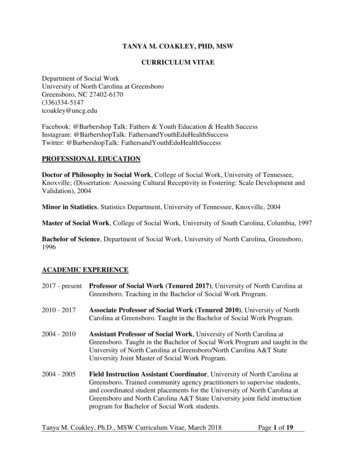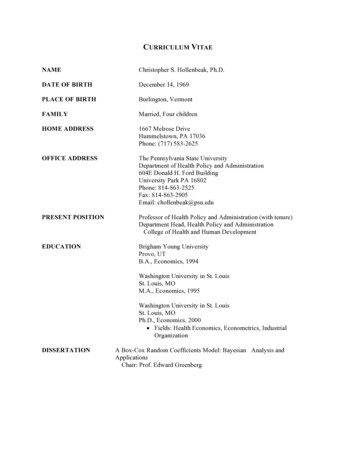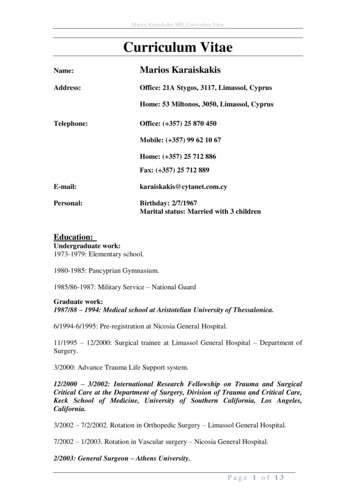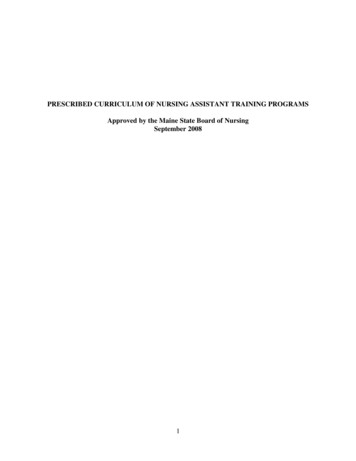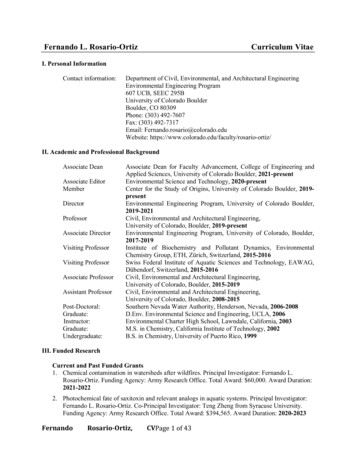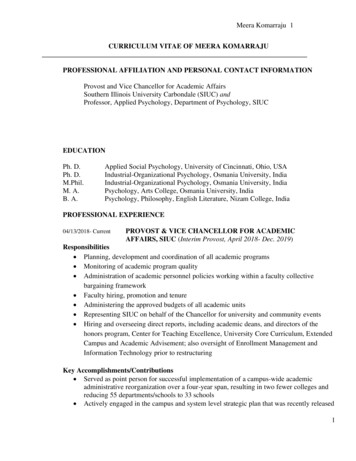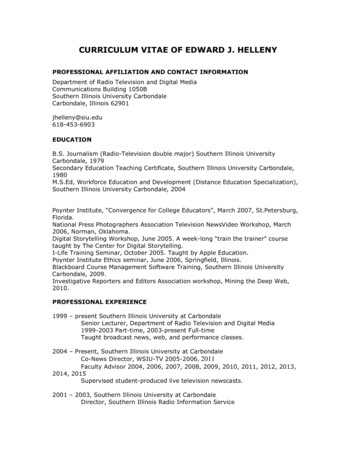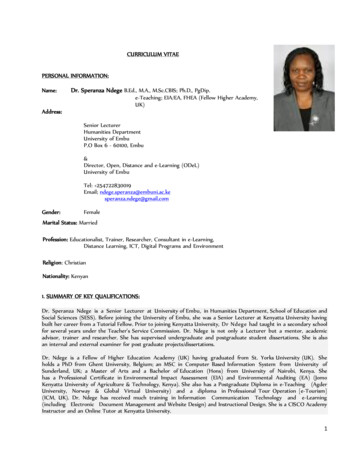
Transcription
CURRICULUM VITAEPERSONAL INFORMATION:Name:Dr. Speranza Ndege B.Ed., M.A., M.Sc.CBIS; Ph.D., PgDip.e-Teaching; EIA/EA, FHEA (Fellow Higher Academy,UK)Address:Senior LecturerHumanities DepartmentUniversity of EmbuP.O Box 6 - 60100, Embu&Director, Open, Distance and e-Learning (ODeL)University of EmbuTel: 254722830019Email; mGender:FemaleMarital Status: MarriedProfession: Educationalist, Trainer, Researcher, Consultant in e-Learning,Distance Learning, ICT, Digital Programs and EnvironmentReligion: ChristianNationality: Kenyan1. SUMMARY OF KEY QUALIFICATIONS:Dr. Speranza Ndege is a Senior Lecturer at University of Embu, in Humanities Department, School of Education andSocial Sciences (SESS). Before joining the University of Embu, she was a Senior Lecturer at Kenyatta University havingbuilt her career from a Tutorial Fellow. Prior to joining Kenyatta University, Dr Ndege had taught in a secondary schoolfor several years under the Teacher’s Service Commission. Dr. Ndege is not only a Lecturer but a mentor, academicadvisor, trainer and researcher. She has supervised undergraduate and postgraduate student dissertations. She is alsoan internal and external examiner for post graduate projects/dissertations.Dr. Ndege is a Fellow of Higher Education Academy (UK) having graduated from St. Yorks University (UK). Sheholds a PhD from Ghent University, Belgium; an MSC in Computer Based Information System from University ofSunderland, UK; a Master of Arts and a Bachelor of Education (Hons) from University of Nairobi, Kenya. Shehas a Professional Certificate in Environmental Impact Assessment (EIA) and Environmental Auditing (EA) (JomoKenyatta University of Agriculture & Technology, Kenya). She also has a Postgraduate Diploma in e-Teaching (AgderUniversity, Norway & Global Virtual University) and a diploma in Professional Tour Operation [e-Tourism](ICM, UK). Dr. Ndege has received much training in Information Communication Technology and e-Learning(including Electronic Document Management and Website Design) and Instructional Design. She is a CISCO AcademyInstructor and an Online Tutor at Kenyatta University.1
Dr. Ndege has practical experience and expertise in ICT, e-Learning, distance learning, training, and research.She is also a Consultant in Environmental Impact Assessment/Audit, e-Content authoring, Online Tutoring, andInstructional Design. She reviews and evaluates academics programmes for institutions of Higher Learning.Dr. Ndege is a Fellow of Higher Education Academy (UK) having graduated from St. Yorks University (UK). Sheholds a PhD from Ghent University, Belgium; an MSC in Computer Based Information System from University ofSunderland, UK; a Master of Arts and a Bachelor of Education (Hons) from University of Nairobi, Kenya. Shehas a Professional Certificate in Environmental Impact Assessment (EIA) and Environmental Auditing (EA) (JomoKenyatta University of Agriculture & Technology, Kenya). She also has a Postgraduate Diploma in e-Teaching (AgderUniversity, Norway & Global Virtual University) and a diploma in Professional Tour Operation [e-Tourism](ICM, UK). Dr. Ndege has received much training in Information Communication Technology and e-Learning(including Electronic Document Management and Website Design) and Instructional Design. She is a CISCO AcademyInstructor and an Online Tutor at Kenyatta University.In August 2013, the Government of Kenya through the Ministry of Education appointed Dr. Ndege into the Technical andPlanning Committee for establishment of the National Open University of Kenya (NOUK). Once established, the newUniversity will enroll local and international students from all over the world to study from the comfort of their homesand work places. The students will utilize modern technology (ICT/e-Learning) to access education.In 2010, Dr. Ndege was appointed a Commissioner of the Broadband Commission for Digital Development a positionshe held for five years (2015). In 2015, Dr. Ndege was re-appointed in the Commission for Sustainable DigitalDevelopment as commissioner for a further two years. In 2017, Dr Ndege’s commitment and hard work in the Commissionearned her an additional two years, making it nine years of consecutive service in this esteemed International Commission.The establishment of the Commission was a joint initiative by the International TelecommunicationUnion (ITU) and the United Nations Educational, Scientific and Cultural Organization (UNESCO). The Commissionhas high level representation from industry leaders, senior policy-makers and governments and international agencies,academia and organizations that are concerned with sustainable development.Dr. Ndege is nicknamed 'e-Learning Champion in Central and Eastern Africa’. In 2003, she boldly championed the firstonline programmes in an institution of higher learning in Kenya, by piloting the joint phase 2 AVU-KU diploma and degreeprogrammes with two external universities, the Royal Melbourne University of Technology (RMIT), Australia for AppliedComputer Science and Curtain University, Australia for Business Administration. The success of these external onlineprogrammes led to the launch of the first e-Learning programmes in Kenya on 14th June 2005. In November 2005, whileattending the ICWE e-Learning Conference in Berlin, Germany, Dr. Ndege met the ICWE Conference Organizers andlobbied for the 2 nd e-Learning Conference to be held in Kenya after the Addis Ababa, Ethiopia Conference of 2006. Inthe same year 2006, ICWE appointed Dr. Ndege a member of the Advisory Board for e-Learning Africa & ICTConferences. In 2007, the Ministry of Education, Science and Technology in Kenya appointed Dr. Ndege into thePlanning Committee that organized the 2nd e-Learning Africa Conference, held in Nairobi the same year. This Conferencewas a turning point for e-Learning development in Kenya and East Africa. Tertiary institutions in Kenya, Uganda,and Tanzania, and some secondary schools started e-Learning programmes. In addition, Dr. Ndege initiated the use ofMoodle Open Source e-Learning Management Software in Kenya in 2007 when she implemented it at Kenyatta University.Today, most institutions in Eastern Africa are using the Moodle Software for online learning. During her tenure as Directorof the Institute of Open, Distance & e-Learning (ODeL) at Kenyatta University, Dr. Ndege trained 73,134 universitystudents in online learning, trained 695 university lecturers in online facilitation and digitized 801 online courses. It isnow compulsory that all newly admitted students into the Distance learning programme at Kenyatta University be issuedwith free mobile gadgets (Tablets) at the beginning of the semester to support their online learning. Other institutionsin Kenya have applauded the use of mobile gadgets in enhancement of e-Learning.Dr. Ndege started teaching at the University of Embu on 21st January 2020 (although her official working date was27th January 2020).Administratively, Dr Ndege is currently the Director Open, Distance and e-Learning (ODeL) at University of Embu.She was appointed in March 2020.2
Dr. Ndege had held similar positions of Director at Kenyatta University for 13 years continuously as follows:2014 May-July 2017, Director, Kenyatta University Television & Radio Services (KUTV-RS)(she established the first Television Station for Kenyatta University)2009- April 2014-Director, Institute of Open Distance & e-Learning (ODeL) (she streamlinedthe existing distance learning programmes and introduced the e-Learningcomponent)2007-2008 - Director, e- Learning Coordinating Centre (e-LCC) (she started the firste-Learning programmes at Kenyatta University. These were the first e-Learningprogrammes in Kenya as well as East and Central Africa)2003-2006 – Director, the African Virtual University (AVU) Learning Centre at KenyattaUniversity (she started the first online programmes in Kenya with two AustralianUniversities)From July 2017-2019, Dr. Ndege was mentoring students in digital programs in the department of Literature. She alsoconsults in e-Learning, Distance Education, Digital/ICT Programs and Environmental Impact Assessment. As part ofcommunity outreach programmes, she is actively involved in rural community development projects to conserve theenvironment most recent ones being in Muranga, Chuka, Uasin Gishu, Nyeri and Kiambu.Dr. Ndege is well versed with the management of institutions of higher learning having served in the high level UniversityManagement Board for a period of 5 years (2009-2013. She works hard to achieve results and has integrity and respect.Dr. Ndege’s hard work in Management of University Units has earned her Extra Mile Awards such as: the UniversityExtra Mile Awards for her'Exemplary role in Computerization of the University' in 2007 and a second University Extra Mile Award in her‘Exemplary Management of the University’s Open, Distance & e-Learning(ODeL) Programmes August 2009 - May 2014.Dr. Ndege has travelled widely to participate in many local and international meetings, facilitated many local andinternational workshops and presented papers in many local and international conferences. She has made presentationsin many countries namely: USA, Canada, United Kingdom, Germany (East & West), France, Denmark, Netherlands,Luxembourg, Finland, Switzerland, Belgium, India, Thailand, Malaysia, South Africa, Ghana, Senegal, Cameroon, Turkey,Egypt, Uganda, Malawi, Rwanda, Ethiopia, Tanzania, Qatar, Dubai and Zanzibar among others.She has a number of publications.2. EDUCATIONACADEMIC QUALIFICATIONS2007M.Sc., Computer Based Information Systems, University of Sunderland – UK in conjunctionwith Jomo Kenyatta University of Agriculture and Technology, Nairobi, Kenya2002PhD., Ghent University (Department of African Languages and Cultures).1990M.A., (Literature) University of Nairobi, Kenya1984B.Ed., Hons (Upper division) University of Nairobi, Kenya.3. PROFESSIONAL QUALIFICATION2011Professional Certificate in Environmental Impact Assessment (EIA) andEnvironmental Auditing (EA) (Jomo Kenyatta University of Agriculture &3
Technology, Kenya).2010Postgraduate Certificate in Academic Practice (PCAP), St John’s YorkUniversity, UK2009 Certificate Course in Instructional Design, e-Content Development, Graphic &Multimedia DesignDiploma in Tourism (Professional International Tour Operations andTechniques, ICM, UK).2008 Postgraduate Diploma, e-Teaching, Agder University, Norway2007CCNA Instructor Certificate Course, CISCO Academy – Jomo KenyattaUniversity of Agriculture and Technology4. FELLOWSHIP AWARD2010-to-date: Fellow of United Kingdom Higher Academy (FHEA)5. WORKING EXPERIENCETeachingJan 2020 - Senior Lecturer, Humanities Department, University of Embu.2003–2019 Senior Lecturer, Department of Literature, Kenyatta University2006 –2009 Mentoring students of Computer Science and Information Technology2008-2009 Cisco Academy Instructor, Kenyatta University1992-2003 Lecturer, Department of Literature, Kenyatta University1990 –1992 Tutorial Fellow, Department of Literature, Kenyatta UniversityAdministrativeMarch 2020 - Director, Open, Distance & e-Learning, University of Embu.May 2014 – July 2017 - Director, Kenyatta University Television & Radio Services (KUTV &RS)2009 – April 2014 - Director, Institute of Open, Distance & e-Learning, Kenyatta University 2005 – 2009 Director, e-Learning Coordinating Centre, Kenyatta University2003 - 2006 - Director, African Virtual University/e-Learning Centre, Kenyatta University6. REPORT(s)/PROJECT(s)//CONSULTANCY (ies)/ UNDERTAKENInternational Reports in Broadband and Sustainable DevelopmentCommissioner and Contributor to the State of Broadband Annual Report 2018 by the Broadband Commissionfor Sustainable Digital Development: the report discusses the advances in mobile broadband (such as 4G and5G) and next-generation satellite technologies which will mean the delivery of digital services more quickly andreliably, with implications for the future of e-health, transportation, education, and disaster relief. The reportpresentation was made in New York in September 2018.4
Commissioner and Contributor to the State of Broadband Annual Report 2017 by the Broadband Commissionfor Sustainable Digital Development: the report explores the current status of broadband around the world,and how it is contributing to development purposes. It explores global trends in broadband connectivity andtechnologies; the developments in policies and regulation; the important applications of broadband forsustainable development; and presents some preliminary policy recommendations. The report presentationwas made in New York in September 2017.Commissioner and Contributor to the State of Broadband Annual Report 2016 by the Broadband Commissionfor Sustainable Digital Development: this is an internationalCommission that works with governments globally to bring about transformative solutions for sustainabledevelopment via use of broadband. The Report has been written with contributions from the Commissionersand the Broadband Commission Secretariat. The report is ready and awaiting presentation to the UNSecretary in New York in September 2016.Commissioner and Contributor to the State of Broadband Annual Report 2015 by the Broadband Commissionfor Sustainable Digital Development: the Commission considers broadband as one of the strongestand most effective tools in bringing about transformative solutions for sustainable development.Governments can accelerate the pace of transformation by linking their development polices to makeuniversal. The Report was written with contributions from the Commissioners and the BroadbandCommission Secretariat. The Report was presented to the UN Secretary in New York in September 2015.Commissioner and Contributor to the Annual Reports by the Broadband Commission for DigitalDevelopment. The yearly reports examined the key role broadband has continued to play in confrontingtoday’s challenges, and building a sound and sustainable future, which, future generations can enjoy. Thereports were written with contributions from the Commissioners and the Broadband Commission Secretariat.The Reports were presented to the UN Secretary in New York in September of each year (2011, 2012, 2013,& 2014).7. LOCAL AND INTERNATIONAL PROJECTS COORDINATED/INITIATED /REPORTS INEDUCATION, E-LEARNING & ICTe-Learning/ICT Expert: Establishment of National Open University of Kenya, (NOUK) Project. The Project wasto address which included: cabinet egreeprogrammes,enrolment, ility,software,internet,collaborations and networking; human resource and development, training, financing, strategic plans, policies,marketing etc. The Project was successfully completed. 2013-2015.Monitoring & Evaluation Expert: Entrepreneurship in IT, Communication Skills and Business StudiesTraining and Mentoring Program project. It was a joint project carried out by Siemens Stiftung (German)Kenyatta University (Kenya),) and Youth Banner (Kenya). The Project was successfully piloted in Muranga,Mbita, Kangemi and Ngoliba, 2014.2009-2013Project Coordinator: The Digitization of Past Examination Papers for Kenyatta University.by Partnership for Higher Education (PHEA).ProjectfundedProject Coordinator: Online Module for Postgraduate Research Methods and Resources for KenyattaUniversity. Project funded by Partnership for Higher Education (PHEA).5
Project Coordinator: Digitization of Online Executive Master’s Programme in Business Administration forKenyatta University. Project funded by Partnership for Higher Education (PHEA).Project Coordinator: Digitization of Chemistry and Communication Skillse-Learning Modules for Kenyatta University, Project funded by Partnership for Higher Education(PHEA).Project Coordinator: Executive Reporting Information System for Kenyatta University. Projectfunded by Partnership for Higher Education (PHEA).Project Coordinator: Digitization of Masters and PhD Thesis in Kenyatta University. Project funded byPartnership for Higher Education (PHEA).e-Learning Moderator: Daad e-Schools: E-Learning In Higher Education: Quality, Assessment and Reviewof e-Learning Content and Learning Processes. Joint Project Carried out by Baden-Wurttemberg CooperativeState University, Germany, United Nations University (Germany), University of Yaunde 1 (Cameroon)University of Cape Town (South Africa) and Kenyatta University (Kenya). DAAD funded. 2012:Initiated and Facilitator: Computerization of Kenyatta University. The Project supplied computers to KenyattaUniversity through the support of Computer Aid International, UK. This project was major as the lecturersand offices were equipped with computers and laptops thus boosting e-Learning in the University was boosted.Through this project the number of computers rose from 800 – 2,800. 2007-2011Monitored and Evaluated, NEPAD e-Schools Pilot Project. This involved assessing the needs of the six (6)NEPAD demo e-schools at initial stage; Testing the toolkit and Report Framework developed by NEPAD;monitoring the development of e-content and its application; monitoring the installation of ICTs and theirusage by the schools and communities; assessing the continuous challenges experienced by girls inthe Girls Schools and the boys in the Boys Schools; submit quarterly reports to the NEPAD Liason Office,Ministry of Education, Kenya. 2005-2007Initiated, implemented and managed the first online Diploma and Degree Programmes in Computer Scienceoffered at Kenyatta University by African Virtual University and Royal Melbourne Institute of TechnologyUniversity (RMIT), Australia. These were the first successful Science Diploma and Degree programme to beoffered online in Kenya in collaboration with a external university. This pilot programme was intensive andlasted for 4 years. Funded by World Bank. 2004-2007Initiated, implemented and managed the first online Diploma and Degree Programmes in BusinessAdministration and Management offered at Kenyatta University by African Virtual University and CurtinUniversity, Australia. These were the first successful Science Diploma and Degree programme to beoffered online in Kenya in collaboration with an external university. This pilot programme was intensive andlasted for 3 years. Funded by World Bank. 2004-2006:8. CONSULTANCY (ies)/ IN EDUCATIONResearcher: Strengthening of University Capacity for promoting, Facilitating and Teaching RuralInnovation Processes (SUCAPRI) project formed a network of teaching and research staff from MakerereUniversity (Uganda), Nairobi University, Egerton University, Kenyatta University, and Jomo KenyattaUniversity of Agriculture and Technology) in Kenya. The active interaction and sharing of knowledgebetween these universities and the International Centre for Development Oriented Research inAgriculture (ICRA) in the Netherlands was to improve teaching practice and research. It was funded byEDULINK– ACP-EU Cooperation Programme in Higher Education. 2012:6
Subject Expert for Module 3 (Success in Reading): e-Learning: OpenEducational Resources for English Language at Junior Secondary School Level in Africa. The Project, which isfunded by Commonwealth of Learning, Vancouver, Canada demonstrates use of ICTs in the classroomincluding graphics and multimedia. Joint Project by Education Subject Experts drawn from Kenya,Zambia, Uganda, India, Tanzania and Nigeria. 2011-2012Researcher: Ethno-Veterinary Medicinal Plants of the Wetlands of Lake Victoria Basin project. The projectaimed at ‘Alleviation of poverty’ in Nyanza Province. The Project, which was funded by SIDA via UICEAfocused on the use of traditional medicinal plants to treat diseases in people and livestock. The projectcovered Nyanza and Western provinces and included Yala Swamp, Yala River, Kano Plains extending towardsNyando River, Kendu Bay, Malcader Swamp (Suri) and Korongo Bay. 2007Researcher: Child Labour and its effects on Education in Urban and Rural Areas: A Case Study ofNairobi and Kisii districts in Kenya. This project investigated theextent in which children are used for provision of child labour for domestic and external activities.The project was carried out in Nairobi and Kisii. 2001Researcher: Female Genital Mutilation in Nyambene District, in Eastern Province of Kenya. The Projectfocused mainly on women, girls and young unmarried men and women from Muthaara, Kalama, Kangeetaand Kiengu extending towards the border of Mulika Game Reserve. 20009. CONSULTANCY (ies)/ IN ENVIRONMENTAL IMPACT ASSESSMENT & AUDITEnvironmentalist (Lead Expert - Reg No.6041 & Team Leader), in Environmental and Social ImpactAssessment (ESIA) for Royal Associates Consulting Engineers, for the project of Makanyanga IrrigationScheme. The Contract entitled ‘Contract No. MOALF/SIVAP/T003/2016-2017, Consultancy Services forConstruction Supervision of Makanyanga Irrigation Scheme in Tharaka Nithi County. Client: Ministry ofAgriculture and Livestock. [The Project was 100% successful). 2018Environmentalist (Lead Expert - Reg No.6041 & Team Leader), for Royal Associates ConsultingEngineers,inEnvironmental Audits of Thogoto–Gikambura– MutarakwaRoads Project: Lot 2. The project involved carrying out an Environmental Audit Study toestablish the impact of the road on the environment, the social effects, occupational and safety health as aresult of the road upgrading to bitumen standards. Client: Kenya Rural Roads Authority (KeRRA). [TheProject was 100% successful). 2016Environmentalist (Lead Expert - Reg No.6041 & Team Leader), for Royal Associates Consulting Engineers, inEnvironmental Audits of Murang’a – Gitugi (D427) and Njumbi – Mioro (E546) Roads Project: Lot 2.The project involved carrying out an Environmental Audit Study to establish the impact of the road on theenvironment, the social effects, occupational and safety health as a result of the road upgrading tobitumen standards. Client: Kenya Rural Roads Authority (KeRRA). [The Project was 100% successful) 2016Environmentalist (Lead Expert - Reg No.6041 & Team Leader), for Royal Associates Consulting Engineers, inEnvironmental Audit of Giakanja – Tetu Mission Road (D434), Kagogi – Ihwa – Ihururu (E576/E1690) andWandumbi – Kigogoini (E573) Roads Project: Lot 1. The project involved carrying out an EnvironmentalAudit Study to establish the impact of the road on the environment, the social effects, occupational andsafety health as a result of the road upgrading to bitumen standards. Client: Kenya Rural Roads Authority(KeRRA). [The Project was 100% successful) 2016Environmentalist (Lead Expert - Reg No.6041 & Team Leader), for Royal Associates Consulting Engineers, inEnvironmental Audits of Environmental Audit of Naromoru – Munyu-Karichen Roads Project (D448) NyeriCounty: Lot 1. The project involved carrying out an Environmental Audit Study to establish the impact ofthe road on the environment, the social effects, occupational and safety health as a result of the road7
upgrading to bitumen standards. Client: Kenya Rural Roads Authority (KeRRA). [The Project was 100%successful). 2016Environmentalist (Lead Expert - Reg No.6041 & Team Leader), for Royal Associates Consulting Engineers, inEnvironmental and Social Impact Assessment Study (ESIA) of Illula-Elgeyo Border-Kapkoi (D296) Road Projectlocated in Uasin-Gishu and Elgeyo Marakwet Counties. The project involved carrying out Environmentaland Social Impact Assessment Study so as to establish the impact on environment and social effects ofupgrading to bitumen standard of the road project from the current gravel/earth standards. Client:Kenya Rural Roads Authority (KeRRA). [The Project was 100% successful). 2015Environmentalist (Lead Expert - Reg No.6041 & Team Leader), for Royal Associates Consulting Engineers, inEnvironmental and Social Impact Assessment Study (ESIA) of Jua Kali–Sugoi - Elgon Estate (E306), JunctionE306-Kosachei–(A104) Atlas & Junction Kosachei–A104 (Turbo) Roads Project located in Uasin-GishuCounty. The project involved carrying out Environmental and Social Impact Assessment Study so as toestablish the impact on environment and social effects of upgrading to bitumen standard of the road.Client: Kenya Rural Roads Authority (KeRRA). [The Project was 100% successful). 2015Environmentalist (Lead Expert - Reg No.6041 & Team Leader), forRoyal ssociates Consulting Engineers, in carrying out a Feasibility Study, Design and Preparation ofTender Documents for Gikindu Irrigation Scheme in Murang’a County. As the Environmentalist, I assessedthe baseline environmental and social conditions identified potential impacts from the project anddeveloped appropriate environmental management and monitoring plans. Client: Ministry of Agriculture. [TheProject was 100% successful). 2012 – 2014Environmentalist (Lead Expert-Reg No.6041) - Assistant/Field Coordinator, forRoyal Associates Consulting Engineers, in Environmental and Social Impact Assessment (ESIA) forMundere-Ruambwa – Nambengele – Bukoma Beach (D251/E1201) Roads. This was a project carried outin Bunyala, Busia District -Kenya. My duties were to generate and provide authorities with information onthe nature and extent of environmental impacts that were likely to come with the rehabilitation/ upgradingand operation of the road. I also undertook environmental considerations and mitigation measuresto be adopted during construction. An Environmental Management Plan (EMP) so as to ensure effectiveimplementations of the recommended environmental management measures was produced. Client: Kenya RuralRoads Authority (KeRRA). [The Project was 100% successful) 2013 – 2014Environmentalist (Lead Expert - Reg No.6041 & Team Leader), Environmental Impact Assessment ProjectReport for Proposed Royal Business Centre - Kenya: Duties were to generate and provide authorities withinformation on the nature and extent of environmental impacts that were likely to come with the rehabilitationand operation of the centre. Social Impact Assessments on the project were done which included all the socialimpact. Also environmental considerations and mitigation measures to be adopted during construction werealso done. An Environmental Management Plan (EMP) so as to ensure effective implementations of therecommended environmental management measures was produced. [The Project was 100% successful). 201310. e-LEARNING/ICT TRAINING FACILITATED OR SUPERVISEDTraining – University of EmbuSupervised 17 Trainings between March – May 2020List of Trainings carried out on e-Learning, University of Embu1.Training of Deans and CODs on ‘Teaching Online Using the Moodle e-Learning Platform’. The training wasconducted online on 31st March 2020 at 9am.8
2.Training of Lecturers from School of Education and Social Sciences (SESS) and School of Business andEconomics (SBE) on ‘Teaching Online Using the Moodle e-Learning Platform’. The training was conductedonline on 31st March 2020 at 2pm3. Training of Lecturers from School of Pure and Applied Sciences (SPAS) and School of Law on ‘TeachingOnline Using the Moodle e-Learning Platform’. The training was conducted online on 1st April 2020 at 9am.4. Training of Lecturers from School of Agriculture (SOA) and School of Nursing (SON) on ‘Teaching OnlineUsing the Moodle e-Learning Platform’. The training was conducted online on 1st April 2020 at 2pm.5. Training of Administrator from Admissions, Library and Academic Programmes ‘Teaching/Learning OnlineUsing the Moodle e-Learning Platform’. The training was conducted online on 2nd April 2020.6. A 2nd Training of Lecturers from School of Education and Social Sciences (SESS) and School of Business andEconomics (SBE) on ‘Giving CATs and Assignments Online Using the Moodle e-Learning Platform’. Thetraining was conducted online on 6th April 2020 at 9am.7. A 2nd Training of Lecturers from School of Pure and Applied Sciences (SPAS) and School of Law on ‘GivingCATs and Assignments Online Using the Moodle e-Learning Platform’. The training was conducted onlineon 1st April 2020 at 2pm.8. Training of 1st Group of Class Representatives on ‘Learning Online Using the Moodle e-Learning Platform’.The training was conducted online on 7th April 2020 at 8.45 am.9. A 2nd Training of Lecturers from School of Agriculture (SOA) and School of Nursing (SON) on ‘Giving CATsand Assignments Online Using the Moodle e-Learning Platform’. The training was conducted online on 7thApril 2020 at 2pm.10. Training of 2nd Group of Class Representatives on ‘Learning Online Using the Moodle e-Learning Platform’.The training was conducted online on 16th April 2020 at 9 am.11. Day 1: Training of Students on ‘Learning Online Using the Moodle e-Learning Platform’. The training wasconducted online in 2 sessions (morning and afternoon) on 20th April 2020.12. Day 2: Training of Students on ‘Learning Online Using the Moodle e-Learning Platform’. The training wasconducted online in 2 sessions (morning and afternoon) on 21st April 2020.13. Day 3: Training of Students on ‘Learning Online Using the Moodle e-Learning Platform’. The training wasconducted online in 2 sessions (morning and afternoon) on 22nd April 2020.14. A make-up Training of Lecturers from all Schools on ‘Teaching Online Using the Moodle e-LearningPlatform’. The training was conducted online on 28th April 2020.15. Day 4: Training of Students on ‘Learning Online Using the Moodle e-Learning Platform’. The training wasconducted online in 2 sessions (morning and afternoon) on 11th May 2020.16. Day 5: Training of Students on ‘Learning Online Using the Moodle e-Learning Platform’. The training wasconducted online in 2 sessions (morning and afternoon) on 12th May 2020.17. Day 6: Training of Students on ‘Learning Online Using the Moodle e-Learning Platform’. The training wasconducted online in 2 sessions (morning and afternoon) on 13th May 2020.9
Training (selected)– Ke
She is also a Consultant in Environmental Impact Assessment/Audit, e-Content authoring, Online Tutoring, and Instructional Design. She reviews and evaluates academics programmes for institutions of Higher Learning. Dr. Ndege is a Fellow of Higher Education Academy (UK) having graduated from St. Yorks University (UK). She
